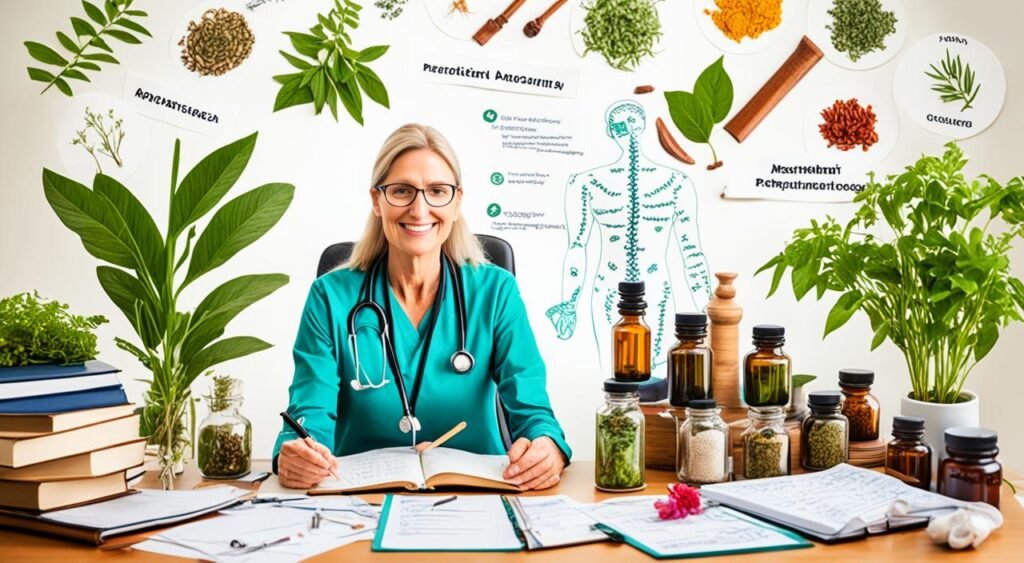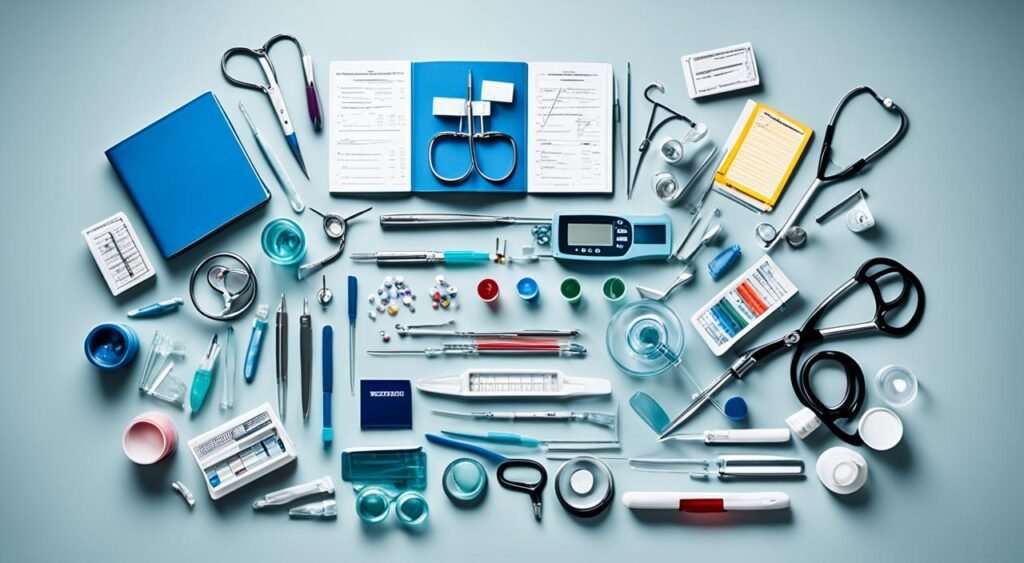Table of Contents
ToggleMedical courses prepare people for careers in healthcare. They cover topics like anatomy, physiology, and pharmacology. Students learn about patient care and medical procedures too.
These courses help students get ready for jobs in nursing, pharmacy, and physical therapy. They’re offered at different levels and in various formats, including online.
Choosing a medical course opens doors to many jobs in healthcare. It’s a great path for those wanting a fulfilling career in medicine. You can become a nurse, pharmacist, or physical therapist, among others.
Key Takeaways
- Medical courses prepare individuals for careers in the healthcare industry, covering a wide range of topics such as anatomy, physiology, pharmacology, and patient care.
- These courses are available at the undergraduate, graduate, and professional levels, and can be delivered through traditional classroom instruction or online learning platforms.
- Enrolling in a medical course can lead to diverse career opportunities in the growing healthcare sector, making it a popular choice for those interested in a rewarding and meaningful career.
- Medical courses equip students with the knowledge and skills necessary to work in various medical fields, including nursing, pharmacy, and physical therapy.
- Pursuing a medical course can provide a strong foundation for a successful career in the healthcare industry, with options to specialize and advance in the field.
Introduction to Medical Courses
The medical field is huge and always changing. It has many specialties and areas of study. People like doctors, nurses, pharmacists, and physical therapists are key to keeping us healthy.
Overview of the Medical Field
The medical field is complex and always changing. It needs a deep understanding of how the body works and how to treat diseases. Medical workers use the latest technology and research to help patients get better.
Importance of Medical Education
Medical education is key for those wanting to work in healthcare. It gives students the knowledge and skills needed for good care. By studying medicine, students learn about the body, diseases, and ethics in medicine. This helps them make a big difference in patients’ lives and move healthcare forward.
Medical education includes many topics like anatomy, physiology, and pharmacology. Students learn through classes, practical exercises, and working in hospitals. This prepares them to diagnose and treat different medical conditions.
| Medical Specialization | Key Focus Areas |
|---|---|
| Cardiology | Diagnosis and treatment of cardiovascular diseases |
| Oncology | Diagnosis and treatment of cancer |
| Neurology | Diagnosis and treatment of disorders of the nervous system |
| Pediatrics | Diagnosis and treatment of medical conditions in children |
Studying medicine is hard but very rewarding. It lets people change lives and help the healthcare industry grow.
Bachelor of Medicine, Bachelor of Surgery (MBBS)

The Bachelor of Medicine, Bachelor of Surgery (MBBS) is a top medical degree program. It trains students to become skilled and caring doctors. This program gives future doctors the knowledge and skills to handle many illnesses and injuries.
Course Details and Curriculum
The MBBS program is 4.5 years long, including an internship. Students learn about anatomy, physiology, allied medicine, community medicine, pediatrics, and microbiology. They learn through lectures, labs, and clinical work. This helps them understand the human body and how to diagnose and treat illnesses.
Career Opportunities and Specializations
After finishing the MBBS program, graduates have many career choices. They can work as general physicians in hospitals, clinics, or private practices. They provide primary care and help prevent illnesses.
Many MBBS graduates also go into specialized fields like cardiology, clinical pharmacology, or psychiatry. This lets them improve their skills and knowledge.
The MBBS degree opens doors to a rewarding career in the medical field. Doctors can greatly impact their patients and the community. Whether they aim for a hospital, clinic, or specialized practice, the MBBS program sets them up for success.
Bachelor of Pharmacy (BPharm)

The Bachelor of Pharmacy (BPharm) is a four-year degree that prepares students for careers as pharmacists. It covers a wide range of subjects. These include pharmaceutical organic chemistry, biochemistry, pathophysiology, pharmacology, pharmaceutical analysis, physical pharmaceutics, pharmaceutical microbiology, medicinal chemistry, and pharmacy practice.
This program gives students a solid base in the pharmaceutical sciences. It helps them become key players in healthcare. Students learn about the chemical makeup of medications and how to make and deliver drugs. This education prepares them for many career paths.
After finishing the BPharm program, graduates have many job options. They can work as pharmacists in hospitals, retail pharmacies, pharmaceutical companies, research labs, or at regulatory bodies. Some might also go on to get a Master of Pharmacy (MPharm) or a Doctor of Pharmacy (PharmD) degree. Others might even get an MBA to open up more career doors.
| Degree | Duration | Eligibility | Entrance Exams | Top Institutes |
|---|---|---|---|---|
| Bachelor of Pharmacy (BPharm) | 4 years | 10+2 with Physics, Chemistry, and Biology/Mathematics |
|
|
The BPharm program is key for those wanting to impact the pharmaceutical field. It offers a deep education and many career paths. This degree is a great choice for those aiming to be pharmacists or pharmaceutical experts.
Bachelor of Physiotherapy (BPT)
The Bachelor of Physiotherapy (BPT) program is a 4.5-year degree. It prepares students to be skilled in restoring and keeping physical function, mobility, and well-being. Students learn about anatomy, physiology, biochemistry, biomechanics, kinesiology, pathology, microbiology, pharmacology, general medicine, general surgery, neurology, and therapeutic techniques.
Program Structure and Specializations
The BPT curriculum gives a solid base in physiotherapy principles. It also lets students specialize. They can focus on orthopedics, neurology, sports physiotherapy, cardiovascular and respiratory physiotherapy, or pediatric physiotherapy.
Clinical Training and Job Prospects
Students get a lot of clinical training, which helps them practice in places like hospitals, private clinics, psychiatric settings, and rehabilitation centers. After graduating, they can work as physiotherapists in the public or private sector. They can also go for a Master of Physiotherapy (MPT) degree.
Many healthcare professionals want to study BPT. It teaches them how to help people with injuries, chronic conditions, or those wanting to get fitter. Graduates help patients improve their health and life quality.
“Physiotherapy is not just about treating injuries; it’s about empowering individuals to achieve their full physical potential and live their best lives.”
Bachelor of Ayurvedic Medicine and Surgery (BAMS)

The Bachelor of Ayurvedic Medicine and Surgery (BAMS) program prepares students to be skilled Ayurvedic practitioners. It’s an ancient Indian system of medicine. It uses natural therapies like diet, lifestyle advice, massage, yoga, meditation, and herbal supplements for health.
The BAMS curriculum includes anatomy, physiology, Ayurvedic pharmacology, social and preventive medicine, and forensic medicine. Students learn about Ayurvedic principles. They learn how to use them to diagnose, treat, and prevent health issues.
After finishing the BAMS program, graduates can work as Ayurvedic doctors, pharmacists, or researchers. They can work in hospitals, clinics, or start their own practices. They might also work in the Ayurvedic drug manufacturing industry or do research to advance Ayurveda.
Many top institutions in India offer the BAMS program. These include the Ayurved Mahavidyalaya, Ayurved & Unani Tibbia College, Banaras Hindu University, The Institute of Medical Sciences, National Institute of Ayurveda, Rajiv Gandhi University of Health Sciences, and Amrita Vishwa Vidyapeetham. To get into these programs, students need to pass the NEET UG exam by the AACCC.
| Degree | Duration | Eligibility | Admission Exam |
|---|---|---|---|
| Bachelor of Ayurvedic Medicine and Surgery (BAMS) | 5.5 years (including 1-year internship) | 10+2 with Physics, Chemistry, and Biology | NEET UG |
The BAMS program combines traditional Ayurvedic knowledge with modern science. It trains students to be skilled Ayurvedic doctors. They can help advance this ancient healing system.
“Ayurveda is not just a medical system, but a way of life that emphasizes the harmony between the mind, body, and spirit.”
Bachelor of Unani Medicine and Surgery (BUMS)

The Bachelor of Unani Medicine and Surgery (BUMS) program explores the ancient and holistic Unani medicine. This system, also known as Tibb, comes from ancient Greece and was made better in the Indian region.
Course Highlights and Curriculum
The BUMS course includes many subjects. These are Kulliyat (basic Unani medicine principles), Ilmul Advia (pharmacology), Amraz E Jild (skin care), Moalijat (treatment methods), Ilmul Qabalat wa Amraze Niswan (women’s health), and Ilmul Saidla (pharmacy).
Students learn both theory and hands-on skills in Unani medicine. They study how to diagnose, treat, prevent, and manage diseases. The focus is on keeping the body’s balance, or Arkan, for health.
Professional Opportunities in Unani Medicine
After finishing the BUMS program, graduates have many job options. They can work in government hospitals, private hospitals, dispensaries, wellness centers, and research institutes. They can also start their own clinical practice or work with Unani medicine-based organizations.
The Unani medicine is recognized by the Central Council of Indian Medicine (CCIM). This group makes sure Indian systems of medicine, like Unani, are followed right. To practice Unani medicine in India, you need a BUMS degree and a license to be a Unani doctor.
Many Urdu language schools and universities in India offer the BUMS program. This lets future Unani doctors follow their dream and help in traditional and alternative medicine.
Medical Courses

The healthcare industry offers many medical courses for different careers. These include nursing, pharmacy, physiotherapy, and Ayurvedic medicine. Each program provides deep training and specializations. You can find a course that fits your interests and career goals, whether in traditional or alternative healthcare.
Students can start these courses at the undergraduate or postgraduate level. They can learn in person or online. These programs cover human anatomy, disease diagnosis, treatment, and medical interventions. They prepare students to give top-quality healthcare.
There are many medical courses to choose from, such as:
- Bachelor of Medicine, Bachelor of Surgery (MBBS)
- Bachelor of Pharmacy (BPharm)
- Bachelor of Physiotherapy (BPT)
- Bachelor of Ayurvedic Medicine and Surgery (BAMS)
- Bachelor of Unani Medicine and Surgery (BUMS)
- Nursing
- Dentistry
- Veterinary medicine
These courses give specialized training and clinical experience. They also offer chances for advanced certifications or postgraduate degrees. Graduates can work in many areas, from general practice to specialized fields. They can work in both public and private healthcare sectors.
| Medical Course | Focus Areas | Career Opportunities |
|---|---|---|
| Bachelor of Medicine, Bachelor of Surgery (MBBS) | Comprehensive medical education, including anatomy, physiology, pathology, and clinical practice | General practitioner, medical specialist, surgeon, public health professional |
| Bachelor of Pharmacy (BPharm) | Pharmaceutical sciences, drug development, medication management, and patient care | Pharmacist, clinical pharmacist, pharmaceutical researcher, medical representative |
| Bachelor of Physiotherapy (BPT) | Musculoskeletal assessment, therapeutic interventions, rehabilitation, and sports medicine | Physiotherapist, sports physiotherapist, rehabilitation specialist, ergonomics consultant |
Whether you want a career in traditional or alternative healthcare, there are many medical courses to choose from. These courses can help you reach your professional goals and make a big difference in patients’ lives.
Also Read : The Power of Regenerative Medicine: Transforming Healthcare
Other Allied Health Programs

The healthcare industry has many allied health programs. These prepare students for roles in patient care, rehabilitation, and more. They give students the skills needed to work in healthcare settings.
Nursing, Occupational Therapy, and Radiography
Nursing is key in healthcare. Nurses give direct care, give medicines, and work with other doctors. Occupational therapy helps people with disabilities to be independent again. Radiography uses imaging to find and treat health issues early.
Speech-Language Pathology and Optometry
Speech-language pathology helps people with speech and communication problems. Optometry focuses on eye and vision care. Students learn to diagnose and treat eye issues.
These programs offer many career paths in healthcare. Graduates work in hospitals, clinics, and more. They help improve people’s health and quality of life.
| Allied Health Program | Focus | Career Opportunities |
|---|---|---|
| Nursing | Direct patient care, medication administration, and coordination with medical professionals | Hospitals, clinics, long-term care facilities, community health organizations |
| Occupational Therapy | Helping individuals with physical, mental, or developmental disabilities regain independence and improve quality of life | Rehabilitation centers, hospitals, schools, private practices |
| Radiography | Diagnostic imaging techniques for early detection and management of medical conditions | Hospitals, imaging centers, private practices |
| Speech-Language Pathology | Assessing, diagnosing, and treating communication disorders, including speech, language, and swallowing difficulties | Hospitals, rehabilitation centers, schools, private practices |
| Optometry | Diagnosing, managing, and treating visual health issues to ensure optimal eye and vision care | Optometry clinics, hospitals, vision centers, private practices |
These allied health programs offer many educational paths and career chances. They help students become experts in patient care. By doing so, they make a big difference in people’s lives.
Entrance Examinations and Admission Process
To get into medical and healthcare programs in the U.S., students must do well in special exams. These include the NEET UG, GPAT, and AACCC. These tests check if students have the right knowledge and skills for their chosen field.
Applying to these programs means filling out detailed forms, sending in academic records, and sometimes going through interviews. Students need to have good grades, complete certain courses, and sometimes have work or volunteer experience.
After passing the exams and meeting the application needs, a special process helps place students in programs. This process looks at a student’s grades and other qualities. It makes sure students get into programs that fit them best.
FAQs
Q: What are some of the best medical courses available?
A: There are a variety of healthcare courses to explore, such as medical terminology, online medicine courses, and courses for becoming a medical assistant.
Q: Can I obtain a certification online in the field of healthcare?
A: Yes, you can certify in various medical areas through online courses that offer certificates upon completion.
Q: What is the significance of a medical assistant in the healthcare industry?
A: Medical assistants play a crucial role in patient care by assisting physicians with administrative and clinical tasks.
Q: How can I earn a certificate in a medical-related field?
A: You can earn a certificate through educational institutions or online platforms that provide courses designed to prepare students for different medical roles.
Q: Are there any advanced medical courses available, such as those offered by prestigious institutions like Harvard Medical School?
A: Yes, there are advanced courses and continuing medical education programs available, including those from institutions like Harvard Medical School.
Q: What is the process to become a certified medical assistant?
A: To become a certified medical assistant, you typically need to complete a training program that includes practical training and documentation of your skills.
Q: Can I find online medical courses with interactive modules for learning?
A: Yes, there are online medical courses with interactive modules designed to engage learners and provide a comprehensive understanding of the subject matter.




